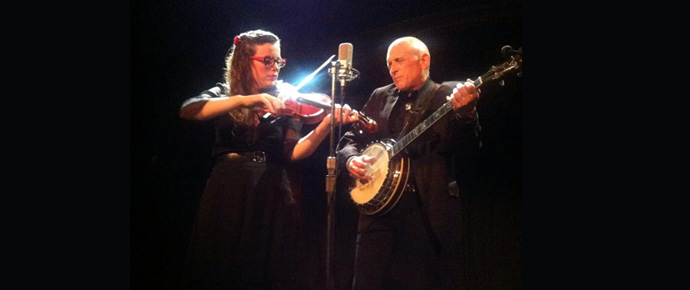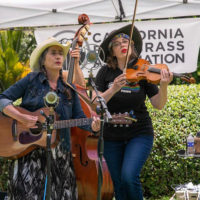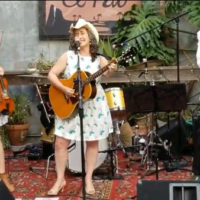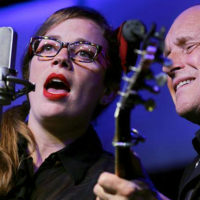
Jody Richardson and Robert Earl Davis
This is an update to a California Bluegrass Association (CBA) Breakdown interview from 2015.
Jody Richardson, is no stranger to San Francisco bluegrass and old-time audiences. She’s played fiddle in two stellar San Francisco bands—the Earl Brothers and the Vivants—and was a regular at Amnesia’s Monday night bluegrass shows. Recently she’s been involved with some other projects that she’ll discuss in more detail below.
Tell us a little about yourself, Jody.
As a native San Franciscan, how did bluegrass and old-time music find you?
My father’s cousin, Gerry Milnes, is an avid folk musician in Elkins, West Virginia. He was the coordinator of the Augusta Heritage Festival at Davis and Elkins College, and worked for the Augusta Heritage Center collecting field recordings of Appalachian music. I remember going to the festival and square dancing with Gerry when I was about four or five years old.
How did you come to play this music?
My father and Gerry were very close growing up, running wild in the woods all summers long in Pennsylvania and New Jersey. Gerry taught my dad to play clawhammer banjo, guitar, etc., and taught him a love of bluegrass and old-time music that made it a permanent part of my family’s listening fabric in daily life. When my father died of cancer in 2002, I wove myself deeply into the grief expressed in many old-time ballads, particularly from the album Come All You Tenderhearted, by Ginny Hawker and Kay Justice, and those most poignant songs from the O Brother, Where Art Thou soundtrack. As I transitioned into fatherlessness, I began to identify strongly with my family’s heritage of music. I feel grateful to have received this gift from him.
What other styles were you exposed to?
My mom is responsible for my deep love of classical music. I technically heard her sing Handel from inside the womb, as she attended San Francisco Conservatory of Music’s Sing it Yourself Messiah. My mother would sing a lot in the house, old folk tunes for lullabies, and wailed to Bob Dylan while cleaning. My father loved to play Scott Joplin tunes on the piano, and banjo and guitar on occasion too. He was constantly listening to old-time and bluegrass music in the house and in the car. I’ll never forget the grating torture of a ripping bluegrass banjo sound blasting through the speakers when I didn’t want to get up for school.
Who are some musical influences outside the family?
My violin teacher Steve Miller definitely instilled the values I most passionately express as a performer. He taught me the value of always expressing myself emotionally through the violin. My next teacher, Robin Sharp, took my perseverance and helped me develop the technique to express myself to the fullest. They both helped to instill in me a deep love, reverence, and respect for music and how it churned inside of me. Additionally, Bach, Taj Mahal, Bob Dylan, Janis Joplin, Laurie Lewis, Mozart, the Violent Femmes, Beethoven, Schubert, and Shostakovich were some of my strongest musical influences as a teenager and college student.
What about bluegrass influences?
Since I’ve come into bluegrass and country more, I would have to say the Davis Sisters, Red Allen, and Robert Earl Davis of the Earl Brothers.
What instruments do you play?
Violin, tap shoes, mountain dulcimer, and, oh yeah, fiddle. I also play guitar nowadays and just started a bit of bass here and there with the Handsome Ladies.
Do you do any composing?
I’ve written four complete songs, and I’m particularly proud that Don’t Call Me Darlin’ was recorded with the Vivants. I would like to someday tap into more of my writing. I think there might be a lot in there.
Jody singing Don’t Call Me Darlin’ with the Vivants at the Freight and Salvage
You’ve played in a variety of bands. Tell us about them.
Dogs in Doublets was the first band I ever played in. You can find a quite illuminating music video online called Nothing Between Us, by said Dogs, that will give you a little bit of a Jody Richardson history lesson. I left the Dogs to move on to what was then called Emily Bonn and the Vivants about four years ago, and I played my first regular gigs with the Vivants. The Vivants have also given me my first experience participating in a professionally produced full-length album, the experience of which is a gift beyond words. I love being in the studio!
I now actively play with a country duet band called Nashville Honeymoon, and I started a new thing with your copy editor Jeanie Poling called the BettyJacks, which explores the music of the Davis Sisters. I also have this fun cover band I’ve been doing called Jody and the Roadies, which is an opportunity for me to get more into leading and make sure I’m surrounded by people with whom I love playing music.
Tell us more about the BettyJacks and the Davis Sisters.
Sure. I sat in with the local duet, Jeanie and Chuck, and discovered that Jeanie and I were both into the Davis Sisters, a country duet act from the ’50s. We figured our voice ranges were a good match, so we decided to do a lot more Davis Sisters songs because those were the ones that were more exciting for us. And that’s how the BettyJacks got started.
How do you feel the Davis Sisters connect to bluegrass?
A lot of what they do is traditional country style. The singing is so raw, emotional, and precise that, in a way, is a model for bluegrass vocals. In bluegrass we care so much about the history, yet women weren’t included much. So why not look at what women were doing in areas where they were contributing and more recognized, like in country music. The Davis Sisters were still in high school when they started singing together. There’s a two CD compilation of their work with great liner notes, and in Skeeter Davis’ autobiography she discusses a connection to their singing and the early pedal steel guitar. Apparently, early steel guitar players listened closely to the Davis Sisters harmonies where they sometimes bend against each other with one person holding a note while the other bends a harmony note against that.
Do the BettyJacks use that note-bending technique?
Yes. We work on that a lot and we incorporate it into some of our other covers to make it match the Davis Sisters sound
The Davis Sisters – I’ve Closed the Door
What Davis Sisters songs do you think might be good for a bluegrass interpretation?
There’s a song Just When I Needed You, which they played with a piano in honkytonk style, that really could make a great bluegrass song. Also, Sorrow and Pain, which is one of the few they actually wrote themselves, is a song that lends itself to bluegrass nicely.
Talk more about being in the Earl Brothers.
The Earl Brothers have been some of my most important bluegrass mentors. The push and pull of all the incredible and knowledgable bluegrass musicians in that group challenged me to formulate a more distinct identity for myself. My participation as the first Earl Sister began as a sort of apprenticeship, getting up on stage at their monthly Monday night at Amnesia performance, and they came to find that I had something they couldn’t do without. I formally joined the band soon after that. It was an honor to be featured on their latest album, Outlaw Hillbilly, and to be a respected part of such an amazing cast of bluegrass masters. I’m proud to be the first woman in the band since its inception.
Tell us about your favorite singers.
Obviously, the Davis Sisters. I’ve also been listening to a lot of Buck Owens, and Molly Burch, who’s a modern ethereal psychedelic rock singer. I love the angelic purity of Alison Krauss’ voice, but I also appreciate a singer with some grit like Ginny Hawker or Janis. I love to listen to blues and soul, and I discovered an amazing singer named Z.Z. Hill. I don’t really have a “type” of favorite singer, but I judge more based on what kind of expression I can hear in their voice. The passion and art that comes through is the most important thing.
Do you approach all genres pretty much the same or are there differences?
As far as I can tell, repetition is the key for any challenging material. In old-time that repetition feels like a profound spiritual meditation. In bluegrass it feels like, “I can’t do this, I can’t do this, I’m only a classical musician after all.” In classical music, it’s actually a beautifully complicated mix between those two extremes, making it the most twisted realm of all.
Do you have any recent or upcoming recordings or shows you can share?
Yes. I’m on a couple of tracks on the Nashville Honeymoon album released on July 31. We’re playing a regular third Wednesday show at Zeitgeist in the Mission in San Francisco.
What interests you when you’re not playing music?
I love to dance and am now learning more about two-step and zydeco. I’m also dedicated to early childhood development and education, and I received a Master’’ in Speech and Language Pathology at Cal State East Bay.
Do you teach music?
I have classical students, but we play some fiddle tunes and improvise occasionally as well. I think it’s important to understand a student’s needs and desires, and to know their personalities well enough to see where they need a little nudging, and where they might need space and time to develop.
What CBA events have you played?
The Earl Brothers were honored to be one of four bands to participate in the CBA luncheon at the 2014 IBMA Conference. It was wonderful to see their music representing California bands, as they’ve been such a staple of the California bluegrass music scene. The BettyJacks played Vern’s Stage at the CBA Fathers’ Day Festival this past June, plus I played with Muleskinner Stomp on Vern’s Stage.
Earl Brothers at 2014 IBMA
Did you have any fun projects when you couldn’t play out as much the last couple of years?
Not really. Honestly what I did more of was appreciate what my friends were doing, so I was engaged more as an audience member. Watching a lot of the online shows and the live shows that were available.
Are there any eras of music that are your favorite?
I can safely say that I prefer every style of roots music that developed between the 1920s and 1960s, or bands that emulate a traditional or vintage style in the modern day.
Do you think this genre is being preserved and will continue to thrive?
Traditional music focuses on the pure playing of an instrument, no tricks or frills, and it illustrates the subtleties of cultures in a way that no other form of expression can. Maintaining traditional forms of music and dance gives us a sense of heritage within this mainstreamed, soul-drained, tech-crunched, plastic world, and reminds us of what it actually feels like to be human beings together. I’m so grateful to the CBA for pumping blood into the veins of California bluegrass music, as it has its own unique tradition in our fair state.
What techniques enabled you to get where you are today?
Putting the hours in is the only thing that can make you feel fluid, natural, expressive, and capable of anything on your instrument. Listening and singing to music that you love, even if it doesn’t seem directly related to what you want to play, is a really important way to develop your ear. Jamming is also important because it forces you to push through performance pressure amongst your peers.
What about playing to live audiences?
Funny, I get more nervous jamming with bluegrassers I don’t know than performing on the stage of the Great American Music Hall or the Freight & Salvage! When I’m on stage I try to make everything in the sound and presence exaggerated, the big and the small, exaggerated to the extreme. The audience cannot see or hear your intention; they can only see and hear what you put out to them. Nerves for a big show always affect the performance, so if you really want to perform at 100 percent, prepare for at least 110 percent.
Can you describe the physical or tonal qualities of why different instruments work or sound better for specific genres?
I think the fiddle is a wonderful instrument for bluegrass and country music because it can emulate the emotional qualities of the human voice and has a very human sounding expressive quality that’s unique to bowed instruments. One thing I love about playing fiddle, as opposed to violin, is getting to enjoy and indulge in the twang that it naturally wants to have, rather than trying to constantly smooth it out and make it flawless and beautiful. Twang is the thang.
What fiddle tunes do you love to play when you first pick up your instrument?
I love the West Virginia tune called Jimmy Johnson, and a Tom Lucas favorite, Leather Britches, has been on my mind a lot lately.
What other artists do you listen to and what about them excites you?
Good writing gets me, but really I love anyone who carries a joy of making music in their performance and a sense raw expression. I’ve never been one for categorizing or naming names. If I hear something I like, I like it, if I hear something I don’t, I don’t. I don’t tend to orient around specific artists too closely.
Any final thoughts or things you want to share with the readers?
I feel like I don’t represent your typical bluegrass musician, and hopefully that goes to show that musicians come in all shapes and sizes and backgrounds and interests and minds.
On the contrary, Jody, folks with your type of background are the new bluegrass norm. Thanks much for your time.
Jody with the Earl Brothers at Great American Music Hall
Copy edited by Jeanie Poling










